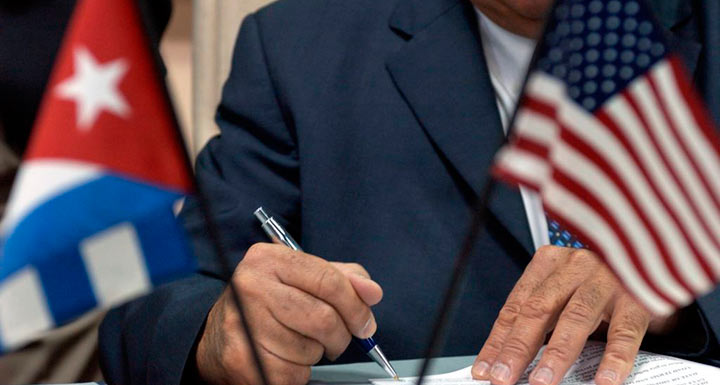
Diplomacy with Cuba: Something to shout about
WASHINGTON, D.C. – When President Obama described our role in assembling the coalition the United States will lead into war, he called it “America at its best.”
But, when a State Department spokesperson took a question about U.S. cooperation with Cuba on an issue of “security and safety,” she reacted like a character in Harry Potter reluctant to say Voldemort, because “We do not speak his name.”
The backstory, reported below in greater detail, involves a private plane flying from upstate New York to Naples, Florida that lost contact with air traffic controllers. As it headed off its flight plan, two F-15 fighter jets were sent to investigate “an unresponsive aircraft [then] flying over the Atlantic Ocean.” Three persons were unresponsive and presumed dead before the plane crashed into the seas off Jamaica, after flying through Cuba’s airspace.
It should have come as no surprise that U.S. authorities were in contact with their Bahamian and Cuban counterparts. “Obviously,” Marie Harf said at the State Department podium, “this is an issue of security and safety, and so we were in touch as well.”
Nor was it a secret. The FAA had already gone on record with a policy statement, “FAA International Strategies 2010-2014, Western Hemisphere Region,” outlining its objectives relating to Cuba:
- Work closely with the Department of Transportation (DOT), Department of State (DOS) and other U.S. Government agencies to support the Administration’s Cuba initiatives and policies as well as FAA mission critical operations.
- Negotiate for the sharing of radar data with key partners adjacent to U.S. delegated airspace: Bahamas, Canada, Cuba, Dominican Republic, Haiti, Mexico, and Saint Maarten.
- Continue to work with the DOS to facilitate safety-critical operational meetings between the FAA and Cuban air traffic officials on a regular basis.
Yet, the terse answers to questions about the plane incident, and if it could be a model for future cooperation, sounded like the State Department was protecting state secrets. Read the full transcript of the briefing here and judge for yourselves.
For example, when Ms. Harf was asked about the flight incident, she offered a sparse 68-word recitation of the facts, before quickly referring reporters to NORAD and the FAA. After saying, “We have been in touch” with Cuba and the Bahamas, she replied, “I don’t have more details on those conversations,” and never mentioned the FAA’s strategy, publicly released in 2010.
As the reporter pressed further on whether the kind of cooperation that took place on the flight could expand to other “issues of national interest, like … security in the region,” she responded with boilerplate language about talks on postal service and migration, but concluded, “I don’t have more for you on that issue than that.”
Apparently, there’s a fine line between putting together a Middle East coalition, an occasion to trumpet national pride, and an example of healthy cooperation with Cuba, which got little more than a meek mention at State.
It’s hard not to notice the contrast. CBS News labeled nations in the coalition as “frenemies” of the United States. As the State Department reported this year, citizens living in at least one of those nations, “lack the right and legal means to change their government; [face] pervasive restrictions on universal rights such as freedom of expression, including on the internet, and freedom of assembly, association, movement, and religion; and a lack of equal rights for women, children, and noncitizen workers.”
While the Administration has engaged with Cuba effectively, on a limited basis and in discrete areas like migration, environment, drug interdiction, and law enforcement, the White House and State Department prefer to keep these activities hidden below-the-radar, as if Parental Discretion was advised in their dealings with the American people.
The U.S. can and should do more. As we said in “9 Ways for US to Talk to Cuba and for Cuba to Talk to US,” it would be in the U.S. national interest to work with Cuba openly and closely on counterterrorism, military affairs, greater exchanges among scientists and artists and the like, while also developing what the countries have lacked for so long: a language for their diplomacy based on engagement instead of preconditions.
Doing this would reflect the values of Cubans and Americans alike. Such public diplomacy would also strengthen those in Cuba who take risks by supporting reform at home and engagement with the U.S. abroad.
Yes, this will be opposed by Members of the U.S. Congress who conflate engagement with appeasement. But, whispering about working with Cuba has never gotten them to stand down, and it never will.
So we say, stop whispering; engage more, unabashedly. If the Administration used its remaining time to make a more forceful commitment to diplomacy with Cuba, that would give all of us something to shout about.
(From the Cuba Central News Blast)


